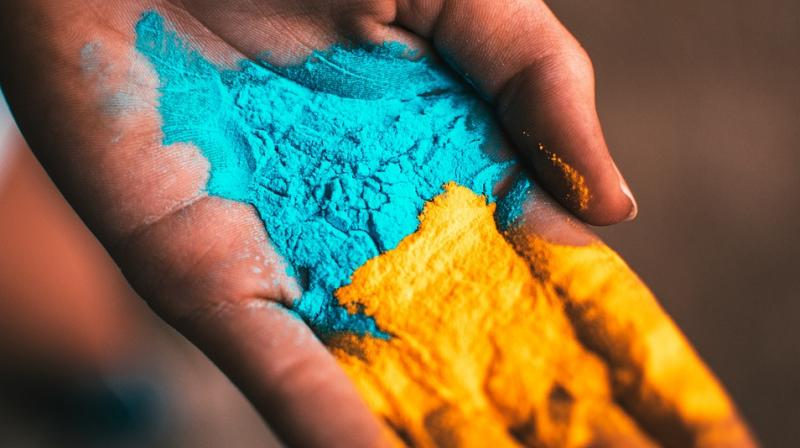Here are dangerous side effects of Holi colours
While Holi is popular, there are dangers too associated with event such as blatant use of artificial and bright colours.

New Delhi: The annual holiday festival of colours, Holi, is less than a week away, and as usual, we can expect the traditional promises to be made of renewed friendship, forgiveness for sins committed in the recent past, and a fun-filled day of frolic marked by a splashing of coloured powder, water and balloons, and a chanting "Holi Hai".
Traditionally spring flowers ,berries, spices and other plants were used for making coloured Gulal and wet colours from flowers like hibiscus etc.
There is no doubt that Holi is one of the popular festivals of India, but there are dangers too associated with the event such as the blatant use of expensive, artificial and bright colours made with the help of chemical solvents and toxic agents like lead oxide, mercury sulphite and copper sulphate etc.
These can damage eyes, skin and lungs, says beauty expert Shahnaz Husain
But again, all of us love this carnival of colours, and according to Husain, can enjoy the festival with the use of organic and home-made colours.
These are available in markets, but cost more.
It is essential to take appropriate safety steps to prevent your skin or hair from getting damaged.
The dry "Gulal" and the wet colours of today are not derived from natural sources. They contain chemicals, shiny particles of mica and even lead, which not only irritate the skin, but collect on the scalp.
Since Holi is played outdoors, exposure to the sun can have a detrimental effect on the skin. Apart from harmful UV radiation, sun-exposure makes the skin dry by causing depletion of moisture and also tans the skin. The skin can become dry and dull after playing Holi.
What, therefore, are the preventives?
Husain advises one and all to apply sunscreen 20 minutes before going out in the sun.
"Use a sunscreen of SPF 20 and above. If your skin is prone to pigmented patches, select a higher SPF. Most sunscreens have built-in moisturizers. If your skin is very dry, first apply the sunscreen, wait for a few minutes and then apply a moisturizer. Apply moisturising lotion or cream on the arms and exposed areas," she says.
For the hair, apply leave-on conditioner or hair serum.
"This protects the hair from the effects of sun exposure and dryness caused by colours. Hair cream containing sunscreen is also available. Take very little, spread on both palms and massage light into the hair, or smooth palms over the hair. Or, apply pure coconut oil and massage it lightly into the hair. This also provides protection against colours," Husain said.
Apply transparent nail varnish on the nails. This helps to protect nails from absorbing Holi colours.
When it comes to removal of colours, rinse the face with plenty of plain water and then use a cleansing cream or lotion. Then wipe off with moist cotton wool. Remember to cleanse the area around the eyes too, using a light touch. A cleansing gel helps to dissolve the colours and facilitates their removal.
"To make your own cleanser, take half a cup of cold milk and add one teaspoon of any vegetable oil, like "til," olive or sunflower oil. Mix well. Dip cotton wool into this mixture and use it to cleanse the skin. Sesame seed (til) oil can be used to remove colours from the body, massaging it on the skin. This not only helps to remove the colours, but gives added protection to the skin. Sesame seed (til) oil actually helps to counteract sun-damage," the beauty expert said.
While bathing, scrub the body gently with a loofah or wash cloth. Immediately after your bath, apply a moisturizer on the face and body, while the skin is still damp. This helps to seal in moisture.
If there is itching, add two tablespoons vinegar to a mug of water and use it as a last rinse. This helps to reduce itching. However, if the itching continues, and there is rash and redness, there may be an allergic reaction to the colour. Consult a doctor as soon as possible.
While washing the hair, first rinse with plenty of plain water to wash away the dry colours and tiny particles of mica. Then apply a mild herbal shampoo, working it into the hair with the fingers. Massage the scalp gently and rinse thoroughly with water again.
Beer can be used as a last rinse. In fact, it will soften and condition the hair. Add the juice of a lemon to the beer. Pour over the hair after shampoo. Leave on for a few minutes and rinse off with plain water.
The day after Holi, mix two tablespoons of honey with half-a-cup of curd. Add a pinch of turmeric. Apply this on the face, neck and arms. Leave it on for 20 minutes and wash off with water. This helps to remove the tan and soften the skin.
Over the next few days, give your hair nourishment by mixing one tablespoon of pure coconut oil with one teaspoon of castor oil.
"Heat and apply on the hair. Then dip a towel in hot water, squeeze out the water and wrap the hot towel around the head, like a turban. Keep it on for five minutes. Repeat the hot towel wrap three to four times. This helps the hair and scalp absorb the oil better. Wash your hair after an hour," Husain concludes.
Shahnaz Husain is an international fame beauty expert and is popularly called as the Herbal Queen of India.

